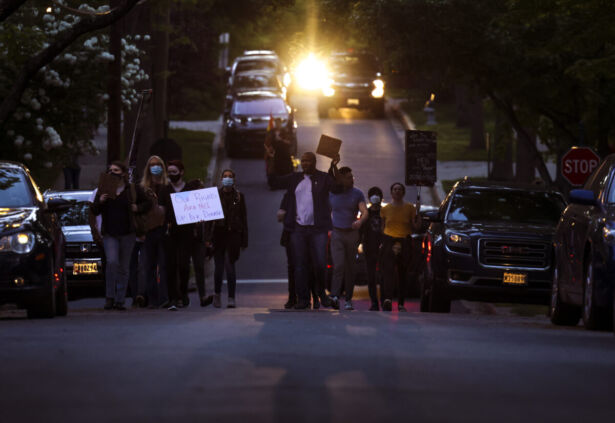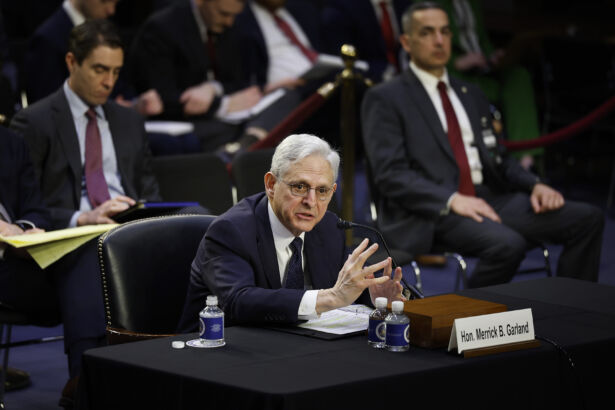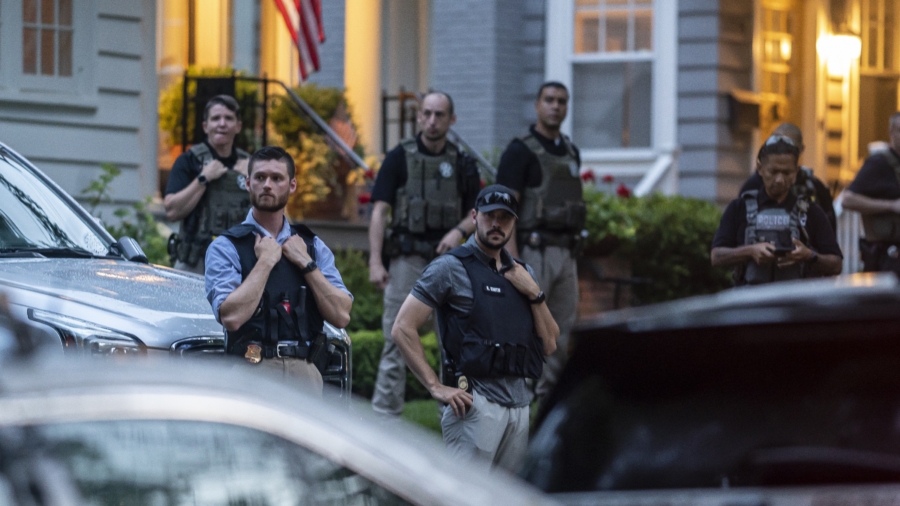A Senate Republican revealed during a March 28 hearing that an internal Department of Justice (DOJ) memo dissuaded U.S. Marshals from arresting protestors in violation of laws against picketing the homes of judges.
The materials (pdf) revealed during the hearing show that U.S. Marshals were explicitly directed not to arrest protestors at the homes of Supreme Court (SCOTUS) justices.
“People want justice to be blind,” said freshman Sen. Katie Britt (R-Ala.), who unveiled the findings during a hearing of the Senate Appropriations Committee. Attorney General Merrick Garland appeared before the panel to testify on the DOJ side of President Joe Biden’s proposed budget.
Section 1507 of U.S. Code prohibits the picketing of Supreme Court (SCOTUS) justices or other federal judges to change the outcome of a legal case. But when protestors demonstrated at the homes of conservative justices to protest their leaked abortion decision in June 2022, U.S. Marshals made few arrests in connection to the statute.
This, Britt revealed, was not a mistake. Rather, she showed that a DOJ memo had directly dissuaded agents from making arrests on the basis of Section 1507, instructing them to arrest protestors only as a “last resort” to protect the justices.
Section 1507 explicitly prohibits “picketing” or “parading” near the residences of judges or justices in order to influence the outcome of a case.
A few weeks earlier, Garland fielded questions from the Senate Judiciary Committee on his agency’s failure to prosecute those picketing the homes of justices.

During that and other testimony, Garland has insisted that the decision to arrest protestors lies with U.S. Marshals.
“U.S. Marshals have the authority to arrest anyone under that statute or any other federal statute,” Garland said. “The attorney general does not make the decision to arrest. The Marshals on the scene—they do make the decision of whether to arrest.”
But newly uncovered materials used to train Marshals to protect the homes of SCOTUS justices show that they were “actively discouraged” from making arrests on grounds of this statute, Britt said.
“Those materials show that the Marshals likely didn’t make any arrests because they were actively discouraged from doing so,” Britt said.
The training materials told the Marshals “to avoid, unless absolutely necessary, any criminal enforcement action involving the protestors.”
Marshals were also told, “Making arrests and initiating prosecutions is not the goal of the [Marshal Service] presence at SCOTUS residences.”
“The ‘not’ is actually italicized and underlined,” Britt noted.
The next slide of the training “not to engage in protest-related enforcement actions, beyond those that were strictly and immediately necessary and tailored to ensure the physical security of the justices.”
Marshals were also explicitly instructed not to enforce Section 1507, as training materials informed them that there “may be a First Amendment right” to protest at the homes of SCOTUS justices.
“Regardless, any arrests of protestors are a last resort to prevent physical harm to the justices or their families,” the training materials told Marshals.
Garland Claims Ignorance
When grilled, Garland claimed that he had never seen the materials before.
“Mr. Attorney General, were you, at any point before your testimony in front of the Judiciary Committee, aware of these training materials or the fact that the Marshals had been heavily discouraged from making arrests under Section 1507?” Britt asked.
“This is the first time I’ve seen this slide,” Garland said.

But Garland said that despite appearances to the contrary, Marshals were still theoretically permitted to make arrests.
“[The Marshals] first and principle job is to protect the lives and property of the members of the court,” Garland said. Garland also said that he was the first attorney general to ever order the Marshals to protect the homes of SCOTUS justices.
“That’s their first priority,” Garland continued. “But that doesn’t mean they are in any way precluded from bringing other kinds of arrests.”
Britt concluded her questioning with a plea for Garland to look into the issue and amend his comments to the Judiciary Committee if needed.
“There’s nothing to amend because I’ve never seen those slides,” Garland said.
“It’s clear the Marshals were given a different directive,” Britt concluded.
Garland has faced allegations of directing the DOJ to partisan ends by House Republicans, who are currently mounting a probe into the Weaponization of the Federal Government. Critics have said that Garland did not enforce Section 1507 due to sympathy with the protestors’ left-wing positions; Garland has continuously claimed that he has no influence over arrests.
From The Epoch Times

